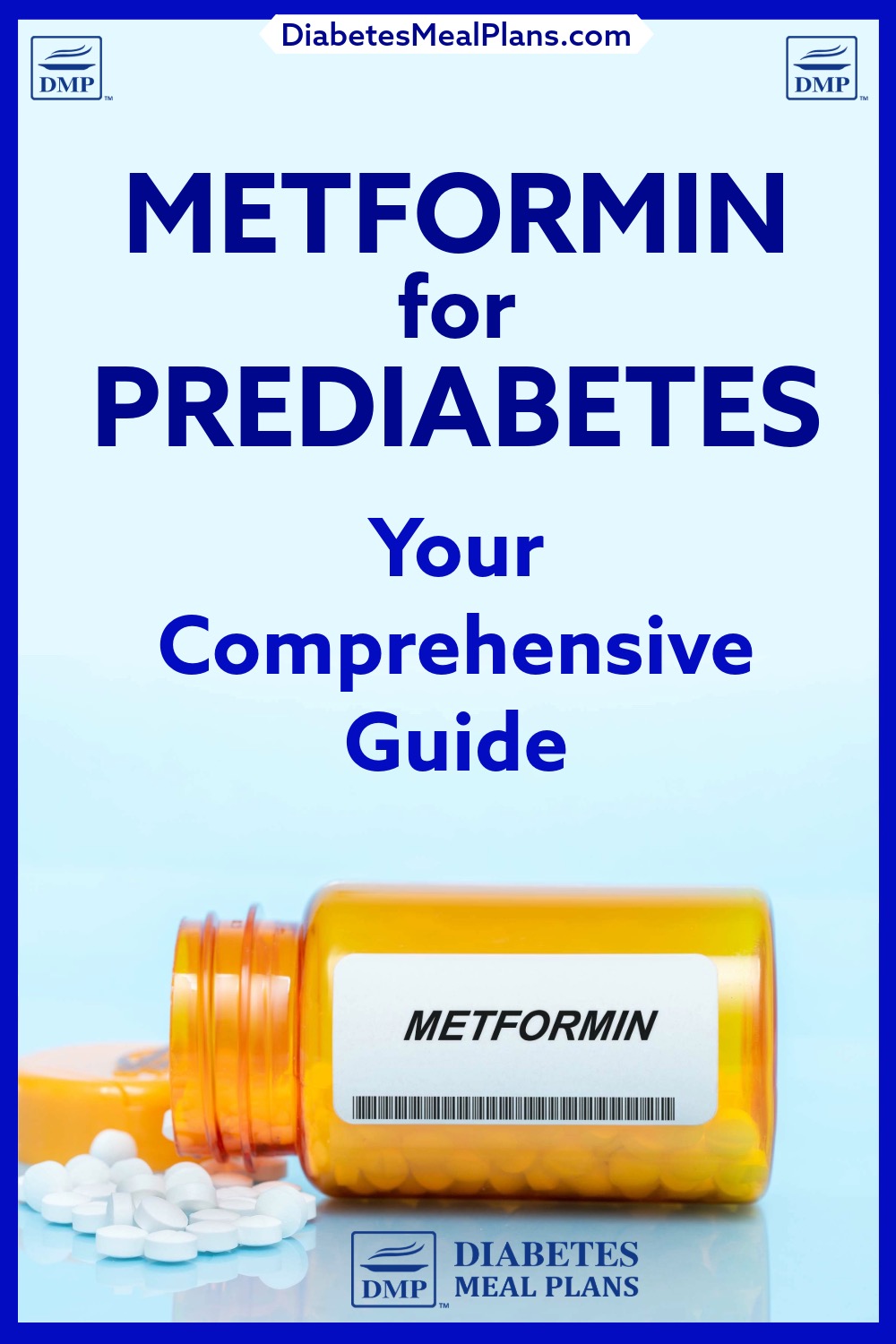Table of Contents[Hide][Show]
If you’ve recently been diagnosed with prediabetes, you may be exploring ways to halt its progression and regain control over your health.
While lifestyle changes like adopting a healthy nutrition plan, increasing physical activity, and managing stress are essential steps, you might be wondering if medication is necessary.
Or perhaps your doctor is pushing you to take medication, but you’d prefer to be informed about the options before going down that road. Either way, you’ll find this information helpful.
The most commonly prescribed medication for prediabetes is metformin.
Here, you will learn how metformin works, its typical dosage, the pros and cons of metformin, and whether it’s truly necessary for managing prediabetes.
You’ll also discover when to start metformin, the best time to take it, and natural alternatives to consider.
If your question isn’t answered, leave it in the comments below – we’ll be happy to help!
How Does Metformin Help Prediabetes?
Metformin is a medication primarily prescribed for type 2 diabetes, but it’s often recommended for people with prediabetes to prevent the condition from worsening.
Metformin works by lowering blood sugar levels in three primary ways:
- Reducing Liver Glucose Production: Metformin decreases the amount of glucose your liver releases into the bloodstream.
- Improving Insulin Sensitivity: It helps your body use insulin more effectively, which facilitates better blood sugar control.
- Enhancing Glucose Absorption in Muscles: Metformin promotes the uptake of glucose into your muscle tissues, where it is used for energy.
When to Start Metformin for Prediabetes
The decision to start metformin for prediabetes typically depends on your individual health profile and the presence of other risk factors.
According to guidelines from the American Diabetes Association, metformin is recommended for people who:
- Have a BMI (Body Mass Index) of 35 or higher.
- Are under the age of 60.
- Have a history of gestational diabetes.
- Show signs of significant insulin resistance, which might be indicated by consistently high blood sugar levels despite lifestyle changes.
In reality, doctors are quick to prescribe medications, when really they should be assessing your overall health and recommending nutrition and lifestyle changes before considering metformin, as it’s often not necessary for prediabetes.
Metformin Dosage for Prediabetes
The standard starting dose for metformin in prediabetes is generally lower than for those with type 2 diabetes.
Most doctors will start with 500 mg once or twice daily. This dosage may be gradually increased to 1,000-2,000 mg per day depending on your tolerance and blood sugar levels.
Your doctor will typically monitor your progress and make adjustments as needed.
While we encourage you to minimize medications, it’s essential to follow the guidance of your doctor and not change your dosage without consulting them.

Pros and Cons of Metformin for Prediabetes
Pros:
- Proven Efficacy: Clinical studies have shown that metformin can reduce the risk of developing type 2 diabetes by up to 31%.
- But keep in mind that nutrition and lifestyle are often more effective for reducing your diabetes risk than medication.
- Supports Weight Management: Metformin may help with weight loss or stabilization, which is beneficial for those managing prediabetes.
- But keep in mind that nutrition and lifestyle are often more effective for weight loss than medication.
- Improves Insulin Sensitivity: This is particularly valuable for those whose prediabetes is marked by insulin resistance.
- But keep in mind that nutrition and lifestyle are highly effective for improving insulin sensitivity and reducing insulin resistance.
Cons:
- Side Effects: Common side effects include gastrointestinal issues such as nausea, diarrhea, and stomach discomfort. These symptoms often improve over time or with gradual dose increases. But in some people they can persist and they can be severe and intolerable.
- Nutrient Depletion: Long-term use of metformin can lead to vitamin B12 deficiency. It’s advisable to monitor vitamin B12 levels periodically.
- Not a Cure: Metformin can help manage blood sugar levels, but it does not cure prediabetes or replace the need for nutrition and lifestyle changes.
Since nutrition and lifestyle provide the best benefits and can reverse prediabetes, it makes sense to avoid medication and focus on being proactive in making nutrition and lifestyle changes!
Is Metformin Really Necessary for Prediabetes?
This is a common question, and the answer is often no.
Prescribing medication is a default for doctors and research shows us that medication is grossly over-prescribed!
The Medical Care Guidelines for Diabetes suggest that nutrition and lifestyle should always be the first line of treatment. Yet, in many cases this is not what happens in a consultation.
People are not being provided with proven nutrition and lifestyle education and guidance, but walk out of the doctors office with a prescription for metformin.
Medication can be a tool to help, for a short time. But even if prescribed medication, it doesn’t mean you need to take it forever.
Most people can successfully reverse prediabetes through nutrition, exercise, and weight management without medication.
We see this all the time in our Prediabetes Reset Program. Most people achieve normal blood sugar levels in just 16 weeks.

After 16 weeks of following the Prediabetes Program and its recommendations, my A1C went from 5.9 to 5.5. Thank you, Dr. Jedha for developing this lifesaving program. Diabetes is a public health problem, and you are in the forefront helping people to take responsibility to reverse this condition. I’ve recommended DMP to friends and to my MD, who was most pleased with my results. In fact, my MD regards my success on DMP as proof that prediabetes can be reversed, and lifestyle change is everything. With gratitude for your great educational program.
~Ann Marie
When is the Best Time to Take Metformin?
If you do take metformin, the best time to take it depends on your doctor’s instructions and how your body tolerates it.
However, here are some general guidelines:
- With Meals: Taking metformin with food can help reduce gastrointestinal side effects.
- Timing: For those prescribed a single dose per day, taking it during your largest meal (often dinner) may be beneficial.
- Extended-Release (ER) Options: If you experience significant side effects, your doctor may prescribe an extended-release version, which is taken once daily and often better tolerated.
But, in terms of optimal timing:
- New research suggests that taking metformin 30-60 minutes before meals could improve blood sugar control even more effectively.
- This timing enhances your body’s natural levels of GLP-1, a hormone that regulates blood sugar and appetite. This small change in your routine could lead to better results in your prediabetes A1c levels.
Are There Natural Alternatives to Metformin?
Absolutely yes there are!
Natural treatment of prediabetes is the best road to follow!
STEP 1. Focus on Nutrition
When it comes to prediabetes, nutrition is the number one natural treatment strategy!
Your nutrition plan should focus on whole foods like non-starchy vegetables, proteins, and healthy fats can significantly impact blood sugar levels.
Reducing processed sugars and carb heavy foods, especially refined carbs helps decrease insulin spikes and supports more stable blood sugar control.
STEP 2. Move More
Exercise stimulates your muscles to use more glucose, which can lower blood sugar levels.
Engaging in a mix of aerobic activities, such as walking or cycling, and resistance training can offer comprehensive benefits.
Aim for at least 150 minutes of moderate-intensity exercise weekly, with added strength training sessions twice a week. That’s about 30 minutes each day.
The key point is, just move your body more!
STEP 3: Replace Metformin with Berberine
Berberine is a natural plant compound that has been shown to lower blood sugar levels similarly to metformin.
In fact, in prediabetes, taking 500 mg of Berberine supplements three times daily for 12 weeks, has been shown to reduce fasting blood sugar levels by 25.6 mg/dL (1.42 mmol/L) and A1c levels by 1%.
Berberine is the perfect natural alternative to replace metformin!
Conclusion
Metformin can be an effective part of a prediabetes management plan, when absolutely necessary.
But, it’s essential to remember that medication is not a substitute for healthy living.
By making targeted nutrition adjustments and doing regular physical activity, you can maximize your chances of reversing prediabetes and preventing type 2 diabetes.
Before starting metformin, consider the alternatives and get proactive with your health.
If you’re already taking metformin, well, you can certainly get off medications, like we see happen with our members all the time!




Lacey
What is the alternative if I can’t tolerate Metformjn?
Dr Jedha
Hi Lacey, for most people with prediabetes, Metformin is not necessary at all. You can lower your A1c to normal in 3-6 months with no medication – listen to episode 69 of my podcast. Another natural alternative is Berberine, which is more effective than Metformin.
beverly saul
My doctor told me to take Berberine as it is the botanical version of Metformin. Didn’t start it yet just wanted to add it to my history.
Dr Jedha
Hi Beverly – it’s great that your doctor is aware of Berberine, as many doctor’s aren’t! Based on all the scientific evidence, it is one of the best supplements to replace Metformin. We have a whole podcast on the science and benefits here.